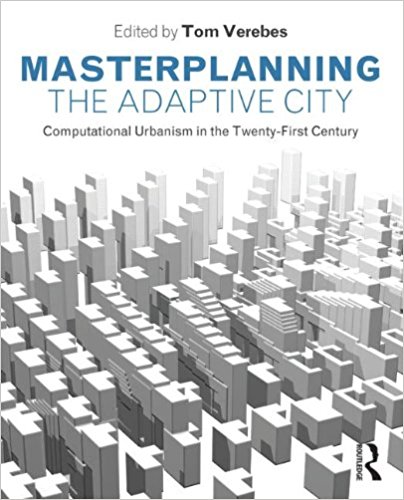
Masterplanning the Adaptive City: Computational Urbanism in the Twenty-First Century
September 2013
By Tom Verebes
Computational design has become widely accepted into mainstream architecture, but this is the first book to advocate applying it to create adaptable masterplans for rapid urban growth, urban heterogeneity, through computational urbanism. Practitioners and researchers here discuss ideas from the fields of architecture, urbanism, the natural sciences, computer science, economics, and mathematics to find solutions for managing urban change in Asia and developing countries throughout the world. Divided into four parts (historical and theoretical background, our current situation, methodologies, and prototypical practices), the book includes a series of essays, interviews, built case studies, and original research to accompany chapters written by editor Tom Verebes to give you the most comprehensive overview of this approach.
Essays by Marina Lathouri, Jorge Fiori, Jonathan Solomon, Patrik Schumacher, Peter Trummer, and David Jason Gerber.
Interviews with Dana Cuff, Xu Wei Guo, Matthew Prior, Tom Barker, Su Yunsheng, and Brett Steele.
Built case studies by Zaha Hadid Architects, James Corner Field Operations, XWG Studio, MAD, OCEAN Consultancy Network, Plasma Studio, Groundlab, Peter Trummer, Serie Architects, dotA, and Rocker-Lange Architects.
- Bracket 2: Goes Soft
- Cities: X Lines: Approaches to City and Open Territory Design
- City Sense and City Design: Writings and Projects of Kevin Lynch
- City Transformed: Urban Architecture at the Beginning of the 21st Century
- Collage City
- Combinatory Urbanism : A Realignment of Complex Behavior and Collective Form
- Critical Spatial Practice #6: The Roundabout Revolutions
- Delirious New York: A Retroactive Manifesto For Manhattan
- Designing Cities
- Event Cities 02
- Event Cities 03
- Event Cities 04
- Fast-Forward Urbanism: Rethinking Architecture's Engagement with the City
- Garden Cities of Tomorrow
- Going Public: Public Architecture, Urbanism And Interventions
- Heterotopia and the City: Public Space in a Postcivil Society
- La rue est à nous... tous! ( The street belongs to all of us! )
- Made in Tokyo: Guide Book
- Masterplanning the Adaptive City: Computational Urbanism in the Twenty-First Century
- Measuring The Non-measurable 02: Tokyo/bangkok/singapore
- Measuring The Non-measurable 03: Mn'm Workbook 1
- Measuring The Non-measurable 04: Mn'm Workbook 2
- Measuring The Non-measurable 05: Post-souvenir City
- Measuring The Non-measurable 06: Subjectivities In Investigation Of The Urban
- Measuring The Non-measurable 07: Mn'm Workbook 3
- Measuring The Non-measurable 08: In The Search Of Urban Quality
- Megastructure Reloaded: Visionary Architecture and Urban Planning of the 1960s Reflected by Contemporary Artists
- Monu #13 Most Valuable Urbanism
- Monu #14 Editing Urbanism
- Monu #15 Post-ideological Urbanism
- Monu #16 Non-urbanism
- Monu #17 Next Urbanism
- Monu #18 Communal Urbanism
- Monu #19 Greater Urbanism
- Monu #20 Geographical Urbanism
- Monu #21 Interior Urbanism
- Monu #22 Transnational Urbanism
- New City Spaces
- Points + Lines: Diagrams and Projects for the City
- Public Space
- Recombinant Urbanism: Conceptual Modeling in Architecture, Urban Design and City Theory
- S,M,L,XL
- Self-Sufficient City
- Small Scale: Creative Solutions for Better City Living
- Sociopolis Project for a City of Future
- System City: Infrastructure and the Space of Flows
- The City In The City: Berlin: A Green Archipelago
- The City, Seen as a Garden of Ideas
- The Death And Life Of Great American Cities
- The Endless City: The Urban Age Project by the London School of Economics and Deutsche Bank's Alfred Herrhausen Society
- The Exposed City: Mapping the Urban Invisibles
- The Public Chance: New Urban Landscapes
- The Self-Sufficient City: Internet has changed our lives but it hasn't changed our cities, yet.
- The Superlative City: Dubai and the Urban Condition in the Early Twenty-First Century
- Urban Future Manifestos
- Urban Intensities: Contemporary Housing Types And Territories
- Urban Solutions: Building Solutions, Green Solutions, Culture and Research
- Urbanity: Twenty Years Later: Projects for Central European Capitals
- Verb Connection
- Writing Urbanism: A Design Reader (The ACSA Architectural Education Series)
- Young-Old: Urban Utopias of an Aging Society


